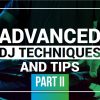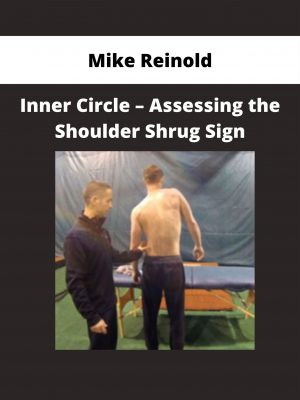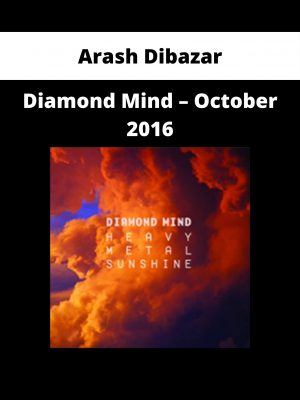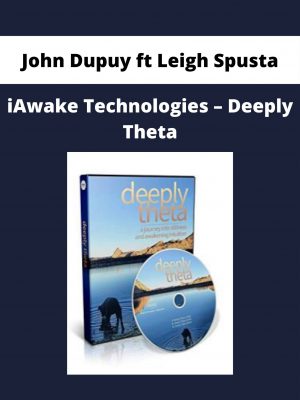Isaac Cotec – DJing with Ableton Live
$300 Original price was: $300.$59Current price is: $59.
Shopping Instructions:
- DISCOUNT 15% : SHOP15
- Product Delivery: Within 1 – 12 hours after purchase.
This course walks you through all of the settings and features you need to know about to take advantage of Ableton Live as a DJ.
Isaac Cotec – DJing with Ableton Live
Course Overview
Ableton Live is a leading software application for both music production and live music. DJs have been able to leverage the software on stage to create mixes with possibilities that are simply not found in the other DJ applications.
This course walks you through all of the settings and features you need to know about to take advantage of Ableton Live as a DJ. You’ll learn how to warp music effectively so that you have full control over pitch and length of each audio sample in your set. You’ll also learn about MIDI mapping efficiently, cross-fading, how to configure the application, and a lot more so that your performances can impress everyone.
Course Curriculum
First Section
Intro to DJing with Ableton Live Course In this video we will introduce the Ableton Live Core Curriculum Course as well as the basics of Ableton Live. We will introduce the teacher, Isaac Cotec aka Subaqueous, and go over the scope of the class. (2:35)
Why Live for DJ “Every software has advantages and disadvantages. Ableton Live is great for Djing, but it also has it’s limitation. Understanding this will let you use the right tool for the right task. In this video we will look at the avantages and disadvantages of using Ableton Live. (7:04)
Navigating Live Ableton live has a lot of working parts. In this video we will be looking at the major aspects of live and getting a sold fondation in navigating the program. We will be looking at the different windows, and how to use them. After this you will have a good grasp of the program. (6:38)
Clips and Tracks The basic musical building blocks of Live are called clips . A clip is a piece of musical material: a melody, a drum pattern, a bassline or a complete song. Live allows you to record and alter clips, and to create larger musical structures from them: songs, scores, remixes, DJ set or stage shows. In this video we will look at using clips. We will also look at creating new tracks and how they function in Live. (12:30)
Basic Audio Setup To get ed Djing we are going to have to use an External Audio Interface. This will allow us to have more then one channel of audio, like Side A and Side B. An external audio interface, or sound card, lets you connect microphones, instruments, and other external sounds to your computer. You don’t need an External Audio Interface, but you will be limiting your sound quality and ability to record. This video will look at the basic setup of you Audio for DJing with an External Audio Interface. (6:42)
External Mixer Show setting up and performing with an External Mixer. (6:55)
Crossfader The Crossfader is one of the most used tools of DJs. A crossfader on a DJ mixer essentially functions like two faders connected side-by-side, but in opposite directions. It allows a DJ to fade one source out while fading another source in at the same time. This is extremely useful when beatmatching two sources of audio After this video you will know the in and outs of using Live’s Crossfader. (6:21)
Constructing a DJ Template Now that we have the basics we can get our set ready in Live. This video will use all the tricks of live to build our first DJ Template. We will be create a basic A / B side setup in live, using the crossfader, and ing our road to DJing with Live (9:02)
Get immediately download Isaac Cotec – DJing with Ableton Live
Warping Audio Live lets you stretch and manipulate audio as if it were elastic. Warping lets us speed up or slow down the timing in a free and easy way. Think of a sample as a rubber-band that you want to pin to a (musical time) ruler. In Live, the pins are called Warp Markers . A Warp Marker locks a specific point in the sample to a specific place in the measure. In this video we will be exploring how to control our tracks with Warping. (18:10)
Warp Modes Every time you Stretch Audio you have to add information to fill in the gaps. Or in speeding it up, you also have to somehow warp the sound to fit the new timing. This is where Warp Modes come in. This video will look at all the warp modes in Ableton Live and how we can use them for DJing. (13:44)
MIDI Mapping MIDI is basically DATA that is interpreted by Ableton Live. There are MIDI Controllers that let us map aspects of live and control them. Having a controller makes Djing a lot easier. In this video we will be setting up a MIDI controler in Ableton Live. (12:48)
DJing Live Example (6:00)
Basic DJ Effects (13:01)
Organizing Music The more organized your tracks and workflow in Ableton Live the quicker you can react during your gig. We will be looking at how to organize these tracks and take the advantage of Ableton Live Browser. (12:18)
Cue Points and Clip Packs Ableton Live offers some unique and powerful ways of orginizing tracks for performance. In this video we will look at a technique called Clip Packs and using them in our Live Set. (16:03)
Adding Loops and Samples Ableton Live is not limited to just playing finished tracks. You can expand your set with added Loops and Samples. This video will dive into building more and more functionality in live with Loops and Samples. (7:38)
Editing and Recording the Mix Live lets us not only DJ on the fly, but it also gives us a host of tools for editing out mixes. This video will look at the basics of using Arrangement view for editing your recordings. (19:16)
Ending the Series (2:00)
Key course topics in DJing with Ableton Live include:
Understanding the software layout in the DJing context
Ableton Live is used for both music production and live performance. You’ll learn how to configure the application so that it is optimized for live performance. You’ll learn how the mixer and track layout parallels that of other DJ software. You’ll get familiar with the cross-fader and the clips, which are the building blocks of Ableton Live.
How to configure any MIDI-based hardware for your DJ setup
DJing requires the right tools for the job. Ableton Live is flexible and rethinks how DJs should perform live. Instead of using turntables or platters on a typical DJ controller, you can use any MIDI-enabled device to control your tracks and your live mix. You’ll learn how to map buttons, faders, knobs, etc. to the Ableton interface so that you can freely change any aspect of your audio on the fly.
Detailed explanations on how to mix and add effects on the fly
Learn everything from warping to mixing to modifying effects on the fly. Warping lets you tweak the pitch and length of any track so that it fits with any other song you want to mix. You’ll also explore the wide array of effects that are built into Ableton Live. You can create your own custom effects racks and save them as presets so that you can call up that perfect suite of tools to tweak your sound in the moment.
Read more: https://archive.is/efoJX
Here’s What You’ll Get in Isaac Cotec – DJing with Ableton Live
Be the first to review “Isaac Cotec – DJing with Ableton Live” Cancel reply
Related products
Personal Development
Personal Development
Personal Development
Mike Reinold – Inner Circle – Assessing the Shoulder Shrug Sign
Personal Development
Personal Development
John Dupuy ft Leigh Spusta – iAwake Technologies – Deeply Theta
Personal Development
Bob Proctor – The secret to Wealth – Mind & Money Strategies
Personal Development
Tony Robbins – New Money Masters Elite + Bonuses [Complete Version]













![Tony Robbins – New Money Masters Elite + Bonuses [complete Version]](https://copicourse.com/wp-content/uploads/2021/08/tony-robbins-new-money-masters-elite-bonuses-complete-version-300x400.jpg)
Reviews
There are no reviews yet.